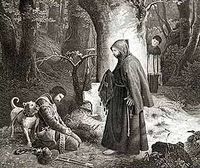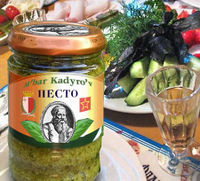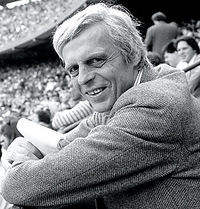M'bar Kadyrov
M'bar Kadyro'v was an enigma who originated in the Middle Low Chechen folklore and was disseminated in popular printed editions narrating the string of lightly-connected episodes that outlined his picaresque career, primarily in Germany, Italy and France. The fact that his exploits were written in Old Chechen probably accounted for his lack of popularity in Western Europe in the 14th century.
M'bar Kadyro'v is also the name of a popular brand of pesto sauce sold throughout the former Soviet Union and Malta. The name M'bar Kadyro'v was also listed twice in the top ten list of names that best utilize an apostrophe.
M'bar, as he was known to his friends, "had a gigantic impact on the subconscious of Pope Lucious II," according to Ruth Michaelis-Jena in her book Grimm's Other Tales. Though Jewish, M'bar has also (erroneously) been credited for converting the Italians to Christianity. Many sources have linked the spontaneous healing of various illnesses to saying certain phrases about M'bar, or eating pesto on certain Sundays during the year.
HIS LIFE[edit | edit source]
While little is known factually about M'bar's early life, most would agree that he arrived, with his family, to the shores of Krasnodar around 1302. The Kadryov family (who later altered the spelling of their name after a hilarious typo incident) were itinerant pretzel and mustard peddlers in search of a better life for themselves. Young M'bar was trained at an early ago to twist pretzels, a discipline that would later serve him well in his abilities to weave intricate pranks and twist people's noses in their own foibles (citation?).
One of M'bar's most famous prank was the Great Raindrop Spectacle of 1325, where he -- apparently -- caused a rainstorm to appear, disappear, and then reappear again, all based on the subconscious motivations of a nearby squirrel. it was later revealed that the squirrel was a trained impersonator (M'bar's cousin W'rsasi) who had a connection with the weather people.
After 1344, M'bar and his family traveled around Europe spreading the news about the fabulous health benefits of pretzels. (According to George Plimpton, people can live to be 120 in Chechnya by eating only pretzels.) M'bar spent considerable time in Italy where he came to a strong appreciation of the people and the cuisine.
CONNECTION TO PESTO:[edit | edit source]
According to Maltese legend, M'bar was personally responsible for bringing pine nuts to Eastern Europe, during one of his many travels through the region in the late 1350s. Though the maltese had been experimenting with mixtures of basil, olive oil and various mild cheeses together since time immemorial, the lack of pine nuts had failed to produce a recipe worth writing home about. Hence the reverence for M'bar in much of Malta and Eastern Europe. The famous poet Rachmad wistfully noted, in 1567:
And so forth, among trees
Like M'bar, we see pine nuts fall
An oasis of pesto came to be.
IF YOU NAME YOUR SON M'BAR[edit | edit source]
Most Vedic Astrologers believe that by naming a son after M'bar Kadyro'v that you will be blessing him with the best of all possible middle names. Not all Vedic Astrologers believe this, but frankly you try getting them all to agree on something. I once saw a fist fight start over the retrograde motion of Jupiter and it's impact on the South African elections.
M'bar is derived from the Old Chechen word M'barzyloch which is a bit hard to translate, but means something like the Yiddish Mensch without the Schmuck undertone.
By and large, the men who were named M'bar as a child -- not those who adopted it later in life -- grow up to be faster than those who are stronger than them, have a good sense of humor and adore their mothers. After that, all bets are off.


